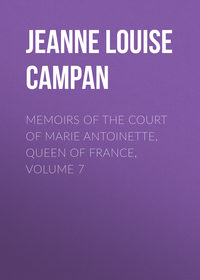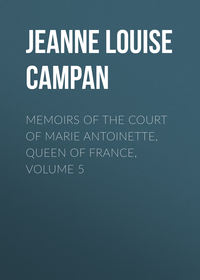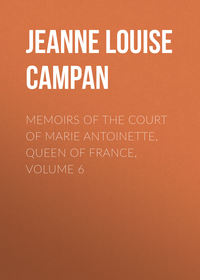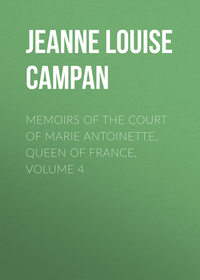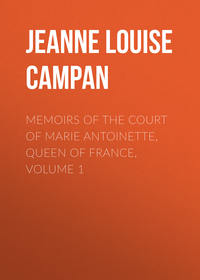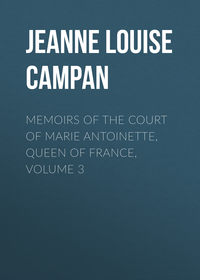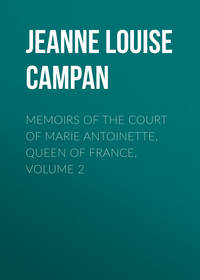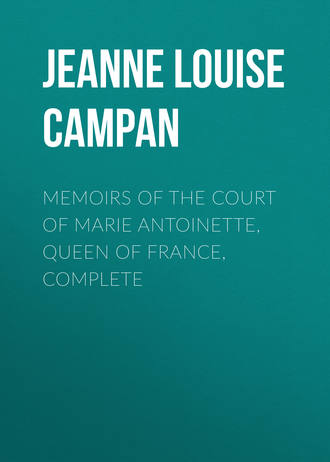 полная версия
полная версияMemoirs of the Court of Marie Antoinette, Queen of France, Complete
“Of what has Elisabeth to complain?” Fouquier-Tinville satirically asked. “At the foot of the guillotine, surrounded by faithful nobility, she may imagine herself again at Versailles.”
“You call my brother a tyrant,” the Princess replied to her accuser; “if he had been what you say, you would not be where you are, nor I before you!”
She was sentenced to death, and showed neither surprise nor grief. “I am ready to die,” she said, “happy in the prospect of rejoining in a better world those whom I loved on earth.”
On being taken to the room where those condemned to suffer at the same time as herself were assembled, she spoke to them with so much piety and resignation that they were encouraged by her example to show calmness and courage like her own. The women, on leaving the cart, begged to embrace her, and she said some words of comfort to each in turn as they mounted the scaffold, which she was not allowed to ascend till all her companions had been executed before her eyes.
[Madame Elisabeth was one of those rare personages only seen at distant intervals during the course of ages; she set an example of steadfast piety in the palace of kings, she lived amid her family the favourite of all and the admiration of the world .... When I went to Versailles Madame Elisabeth was twenty-two years of age. Her plump figure and pretty pink colour must have attracted notice, and her air of calmness and contentment even more than her beauty. She was fond of billiards, and her elegance and courage in riding were remarkable. But she never allowed these amusements to interfere with her religious observances. At that time her wish to take the veil at St. Cyr was much talked of, but the King was too fond of his sister to endure the separation. There were also rumours of a marriage between Madame Elisabeth and the Emperor Joseph. The Queen was sincerely attached to her brother, and loved her sister-in-law most tenderly; she ardently desired this marriage as a means of raising the Princess to one of the first thrones in Europe, and as a possible means of turning the Emperor from his innovations. She had been very carefully educated, had talent in music and painting, spoke Italian and a little Latin, and understood mathematics.... Her last moments were worthy of her courage and virtue.—D’HEZECQUES’s “Recollections,” pp. 72-75.]
“It is impossible to imagine my distress at finding myself separated from my aunt,” says Madame Royale. “Since I had been able to appreciate her merits, I saw in her nothing but religion, gentleness, meekness, modesty, and a devoted attachment to her family; she sacrificed her life for them, since nothing could persuade her to leave the King and Queen. I never can be sufficiently grateful to her for her goodness to me, which ended only with her life. She looked on me as her child, and I honoured and loved her as a second mother. I was thought to be very like her in countenance, and I feel conscious that I have something of her character. Would to God I might imitate her virtues, and hope that I may hereafter deserve to meet her, as well as my dear parents, in the bosom of our Creator, where I cannot doubt that they enjoy the reward of their virtuous lives and meritorious deaths.”
Madame Royale vainly begged to be allowed to rejoin her mother or her aunt, or at least to know their fate. The municipal officers would tell her nothing, and rudely refused her request to have a woman placed with her. “I asked nothing but what seemed indispensable, though it was often harshly refused,” she says. “But I at least could keep myself clean. I had soap and water, and carefully swept out my room every day. I had no light, but in the long days I did not feel this privation much . . . . I had some religious works and travels, which I had read over and over. I had also some knitting, ‘qui m’ennuyait beaucoup’.” Once, she believes, Robespierre visited her prison:
[It has been said that Robespierre vainly tried to obtain the hand of Mademoiselle d’Orleans. It was also rumoured that Madame Royale herself owed her life to his matrimonial ambition.]
“The officers showed him great respect; the people in the Tower did not know him, or at least would not tell me who he was. He stared insolently at me, glanced at my books, and, after joining the municipal officers in a search, retired.”
[On another occasion “three men in scarfs,” who entered the Princess’s room, told her that they did not see why she should wish to be released, as she seemed very comfortable! “It is dreadful,’ I replied, ‘to be separated for more than a year from one’s mother, without even hearing what has become of her or of my aunt.’—‘You are not ill?’—‘No, monsieur, but the cruellest illness is that of the heart’—’ We can do nothing for you. Be patient, and submit to the justice and goodness of the French people: I had nothing more to say.”—DUCHESSE D’ANGOULEME, “Royal Memoirs,” p. 273.]
When Laurent was appointed by the Convention to the charge of the young prisoners, Madame Royale was treated with more consideration. “He was always courteous,” she says; he restored her tinderbox, gave her fresh books, and allowed her candles and as much firewood as she wanted, “which pleased me greatly.” This simple expression of relief gives a clearer idea of what the delicate girl must have suffered than a volume of complaints.
But however hard Madame Royale’s lot might be, that of the Dauphin was infinitely harder. Though only eight years old when he entered the Temple, he was by nature and education extremely precocious; “his memory retained everything, and his sensitiveness comprehended everything.” His features “recalled the somewhat effeminate look of Louis XV., and the Austrian hauteur of Maria Theresa; his blue eyes, aquiline nose, elevated nostrils, well-defined mouth, pouting lips, chestnut hair parted in the middle and falling in thick curls on his shoulders, resembled his mother before her years of tears and torture. All the beauty of his race, by both descents, seemed to reappear in him.”—[Lamartine]—For some time the care of his parents preserved his health and cheerfulness even in the Temple; but his constitution was weakened by the fever recorded by his sister, and his gaolers were determined that he should never regain strength.
“What does the Convention intend to do with him?” asked Simon, when the innocent victim was placed in his clutches. “Transport him?”
“No.”
“Kill him?”
“No.”
“Poison him?”
“No.”
“What, then?”
“Why, get rid of him.”
For such a purpose they could not have chosen their instruments better. “Simon and his wife, cut off all those fair locks that had been his youthful glory and his mother’s pride. This worthy pair stripped him of the mourning he wore for his father; and as they did so, they called it ‘playing at the game of the spoiled king.’ They alternately induced him to commit excesses, and then half starved him. They beat him mercilessly; nor was the treatment by night less brutal than that by day. As soon as the weary boy had sunk into his first profound sleep, they would loudly call him by name, ‘Capet! Capet!’ Startled, nervous, bathed in perspiration, or sometimes trembling with cold, he would spring up, rush through the dark, and present himself at Simon’s bedside, murmuring, tremblingly, ‘I am here, citizen.’—‘Come nearer; let me feel you.’ He would approach the bed as he was ordered, although he knew the treatment that awaited him. Simon would buffet him on the head, or kick him away, adding the remark, ‘Get to bed again, wolfs cub; I only wanted to know that you were safe.’ On one of these occasions, when the child had fallen half stunned upon his own miserable couch, and lay there groaning and faint with pain, Simon roared out with a laugh, ‘Suppose you were king, Capet, what would you do to me?’ The child thought of his father’s dying words, and said, ‘I would forgive you.’”—[THIERS]
The change in the young Prince’s mode of life, and the cruelties and caprices to which he was subjected, soon made him fall ill, says his sister. “Simon forced him to eat to excess, and to drink large quantities of wine, which he detested . . . . He grew extremely fat without increasing in height or strength.” His aunt and sister, deprived of the pleasure of tending him, had the pain of hearing his childish voice raised in the abominable songs his gaolers taught him. The brutality of Simon “depraved at once the body and soul of his pupil. He called him the young wolf of the Temple. He treated him as the young of wild animals are treated when taken from the mother and reduced to captivity,—at once intimidated by blows and enervated by taming. He punished for sensibility; he rewarded meanness; he encouraged vice; he made the child wait on him at table, sometimes striking him on the face with a knotted towel, sometimes raising the poker and threatening to strike him with it.”
[Simon left the Temple to become a municipal officer. He was involved in the overthrow of Robespierre, and guillotined the day after him, 29th July, 1794.]
Yet when Simon was removed the poor young Prince’s condition became even worse. His horrible loneliness induced an apathetic stupor to which any suffering would have been preferable. “He passed his days without any kind of occupation; they did not allow him light in the evening. His keepers never approached him but to give him food;” and on the rare occasions when they took him to the platform of the Tower, he was unable or unwilling to move about. When, in November, 1794, a commissary named Gomin arrived at the Temple, disposed to treat the little prisoner with kindness, it was too late. “He took extreme care of my brother,” says Madame Royale. “For a long time the unhappy child had been shut up in darkness, and he was dying of fright. He was very grateful for the attentions of Gomin, and became much attached to him.” But his physical condition was alarming, and, owing to Gomin’s representations, a commission was instituted to examine him. “The commissioners appointed were Harmond, Mathieu, and Reverchon, who visited ‘Louis Charles,’ as he was now called, in the month of February, 1795. They found the young Prince seated at a square deal table, at which he was playing with some dirty cards, making card houses and the like,—the materials having been furnished him, probably, that they might figure in the report as evidences of indulgence. He did not look up from the table as the commissioners entered. He was in a slate-coloured dress, bareheaded; the room was reported as clean, the bed in good condition, the linen fresh; his clothes were also reported as new; but, in spite of all these assertions, it is well known that his bed had not been made for months, that he had not left his room, nor was permitted to leave it, for any purpose whatever, that it was consequently uninhabitable, and that he was covered with vermin and with sores. The swellings at his knees alone were sufficient to disable him from walking. One of the commissioners approached the young Prince respectfully. The latter did not raise his head. Harmond in a kind voice begged him to speak to them. The eyes of the boy remained fixed on the table before him. They told him of the kindly intentions of the Government, of their hopes that he would yet be happy, and their desire that he would speak unreservedly to the medical man that was to visit him. He seemed to listen with profound attention, but not a single word passed his lips. It was an heroic principle that impelled that poor young heart to maintain the silence of a mute in presence of these men. He remembered too well the days when three other commissaries waited on him, regaled him with pastry and wine, and obtained from him that hellish accusation against the mother that he loved. He had learnt by some means the import of the act, so far as it was an injury to his mother. He now dreaded seeing again three commissaries, hearing again kind words, and being treated again with fine promises. Dumb as death itself he sat before them, and remained motionless as stone, and as mute.” [THIERS]
His disease now made rapid progress, and Gomin and Lasne, superintendents of the Temple, thinking it necessary to inform the Government of the melancholy condition of their prisoner, wrote on the register: “Little Capet is unwell.” No notice was taken of this account, which was renewed next day in more urgent terms: “Little Capet is dangerously ill.” Still there was no word from beyond the walls. “We must knock harder,” said the keepers to each other, and they added, “It is feared he will not live,” to the words “dangerously ill.” At length, on Wednesday, 6th May, 1795, three days after the first report, the authorities appointed M. Desault to give the invalid the assistance of his art. After having written down his name on the register he was admitted to see the Prince. He made a long and very attentive examination of the unfortunate child, asked him many questions without being able to obtain an answer, and contented himself with prescribing a decoction of hops, to be taken by spoonfuls every half-hour, from six o’clock in the morning till eight in the evening. On the first day the Prince steadily refused to take it. In vain Gomin several times drank off a glass of the potion in his presence; his example proved as ineffectual as his words. Next day Lasne renewed his solicitations. “Monsieur knows very well that I desire nothing but the good of his health, and he distresses me deeply by thus refusing to take what might contribute to it. I entreat him as a favour not to give me this cause of grief.” And as Lasne, while speaking, began to taste the potion in a glass, the child took what he offered him out of his hands. “You have, then, taken an oath that I should drink it,” said he, firmly; “well, give it me, I will drink it.” From that moment he conformed with docility to whatever was required of him, but the policy of the Commune had attained its object; help had been withheld till it was almost a mockery to supply it.
The Prince’s weakness was excessive; his keepers could scarcely drag him to the, top of the Tower; walking hurt his tender feet, and at every step he stopped to press the arm of Lasne with both hands upon his breast. At last he suffered so much that it was no longer possible for him to walk, and his keeper carried him about, sometimes on the platform, and sometimes in the little tower, where the royal family had lived at first. But the slight improvement to his health occasioned by the change of air scarcely compensated for the pain which his fatigue gave him. On the battlement of the platform nearest the left turret, the rain had, by perseverance through ages, hollowed out a kind of basin. The water that fell remained there for several days; and as, during the spring of 1795, storms were of frequent occurrence, this little sheet of water was kept constantly supplied. Whenever the child was brought out upon the platform, he saw a little troop of sparrows, which used to come to drink and bathe in this reservoir. At first they flew away at his approach, but from being accustomed to see him walking quietly there every day, they at last grew more familiar, and did not spread their wings for flight till he came up close to them. They were always the same, he knew them by sight, and perhaps like himself they were inhabitants of that ancient pile. He called them his birds; and his first action, when the door into the terrace was opened, was to look towards that side,—and the sparrows were always there. He delighted in their chirping, and he must have envied them their wings.
Though so little could be done to alleviate his sufferings, a moral improvement was taking place in him. He was touched by the lively interest displayed by his physician, who never failed to visit him at nine o’clock every morning. He seemed pleased with the attention paid him, and ended by placing entire confidence in M. Desault. Gratitude loosened his tongue; brutality and insult had failed to extort a murmur, but kind treatment restored his speech he had no words for anger, but he found them to express his thanks. M. Desault prolonged his visits as long as the officers of the municipality would permit. When they announced the close of the visit, the child, unwilling to beg them to allow a longer time, held back M. Desault by the skirt of his coat. Suddenly M. Desault’s visits ceased. Several days passed and nothing was heard of him. The keepers wondered at his absence, and the poor little invalid was much distressed at it. The commissary on duty (M. Benoist) suggested that it would be proper to send to the physician’s house to make inquiries as to the cause of so long an absence. Gomin and Larne had not yet ventured to follow this advice, when next day M. Benoist was relieved by M. Bidault, who, hearing M. Desault’s name mentioned as he came in, immediately said, “You must not expect to see him any more; he died yesterday.”
M. Pelletan, head surgeon of the Grand Hospice de l’Humanite, was next directed to attend the prisoner, and in June he found him in so alarming a state that he at once asked for a coadjutor, fearing to undertake the responsibility alone. The physician—sent for form’s sake to attend the dying child, as an advocate is given by law to a criminal condemned beforehand—blamed the officers of the municipality for not having removed the blind, which obstructed the light, and the numerous bolts, the noise of which never failed to remind the victim of his captivity. That sound, which always caused him an involuntary shudder, disturbed him in the last mournful scene of his unparalleled tortures. M. Pelletan said authoritatively to the municipal on duty, “If you will not take these bolts and casings away at once, at least you can make no objection to our carrying the child into another room, for I suppose we are sent here to take charge of him.” The Prince, being disturbed by these words, spoken as they were with great animation, made a sign to the physician to come nearer. “Speak lower, I beg of you,” said he; “I am afraid they will hear you up-stairs, and I should be very sorry for them to know that I am ill, as it would give them much uneasiness.”
At first the change to a cheerful and airy room revived the Prince and gave him evident pleasure, but the improvement did not last. Next day M. Pelletan learned that the Government had acceded to his request for a colleague. M. Dumangin, head physician of the Hospice de l’Unite, made his appearance at his house on the morning of Sunday, 7th June, with the official despatch sent him by the committee of public safety. They repaired together immediately to the Tower. On their arrival they heard that the child, whose weakness was excessive, had had a fainting fit, which had occasioned fears to be entertained that his end was approaching. He had revived a little, however, when the physicians went up at about nine o’clock. Unable to contend with increasing exhaustion, they perceived there was no longer any hope of prolonging an existence worn out by so much suffering, and that all their art could effect would be to soften the last stage of this lamentable disease. While standing by the Prince’s bed, Gomin noticed that he was quietly crying, and asked him. kindly what was the matter. “I am always alone,” he said. “My dear mother remains in the other tower.” Night came,—his last night,—which the regulations of the prison condemned him to pass once more in solitude, with suffering, his old companion, only at his side. This time, however, death, too, stood at his pillow. When Gomin went up to the child’s room on the morning of 8th June, he said, seeing him calm, motionless, and mute:
“I hope you are not in pain just now?”
“Oh, yes, I am still in pain, but not nearly so much,—the music is so beautiful!”
Now there was no music to be heard, either in the Tower or anywhere near.
Gomin, astonished, said to him, “From what direction do you hear this music?”
“From above!”
“Have you heard it long?”
“Since you knelt down. Do you not hear it? Listen! Listen!” And the child, with a nervous motion, raised his faltering hand, as he opened his large eyes illuminated by delight. His poor keeper, unwilling to destroy this last sweet illusion, appeared to listen also.
After a few minutes of attention the child again started, and cried out, in intense rapture, “Amongst all the voices I have distinguished that of my mother!”
These were almost his last words. At a quarter past two he died, Lasne only being in the room at the time. Lasne acquainted Gomin and Damont, the commissary on duty, with the event, and they repaired to the chamber of death. The poor little royal corpse was carried from the room into that where he had suffered so long,—where for two years he had never ceased to suffer. From this apartment the father had gone to the scaffold, and thence the son must pass to the burial-ground. The remains were laid out on the bed, and the doors of the apartment were set open,—doors which had remained closed ever since the Revolution had seized on a child, then full of vigour and grace and life and health!
At eight o’clock next morning (9th June) four members of the committee of general safety came to the Tower to make sure that the Prince was really dead. When they were admitted to the death-chamber by Lasne and Damont they affected the greatest indifference. “The event is not of the least importance,” they repeated, several times over; “the police commissary of the section will come and receive the declaration of the decease; he will acknowledge it, and proceed to the interment without any ceremony; and the committee will give the necessary directions.” As they withdrew, some officers of the Temple guard asked to see the remains of little Capet. Damont having observed that the guard would not permit the bier to pass without its being opened, the deputies decided that the officers and non-commissioned officers of the guard going off duty, together with those coming on, should be all invited to assure themselves of the child’s death. All having assembled in the room where the body lay, he asked them if they recognised it as that of the ex-Dauphin, son of the last King of France. Those who had seen the young Prince at the Tuileries, or at the Temple (and most of them had), bore witness to its being the body of Louis XVII. When they were come down into the council-room, Darlot drew up the minutes of this attestation, which was signed by a score of persons. These minutes were inserted in the journal of the Temple tower, which was afterwards deposited in the office of the Minister of the Interior.
During this visit the surgeons entrusted with the autopsy arrived at the outer gate of the Temple. These were Dumangin, head physician of the Hospice de l’Unite; Pelletan, head surgeon of the Grand Hospice de l’Humanite; Jeanroy, professor in the medical schools of Paris; and Laasus, professor of legal medicine at the Ecole de Sante of Paris. The last two were selected by Dumangin and Pelletan because of the former connection of M. Lassus with Mesdames de France, and of M. Jeanroy with the House of Lorraine, which gave a peculiar weight to their signatures. Gomin received them in the council-room, and detained them until the National Guard, descending from the second floor, entered to sign the minutes prepared by Darlot. This done, Lasne, Darlot, and Bouquet went up again with the surgeons, and introduced them into the apartment of Louis XVII., whom they at first examined as he lay on his death-bed; but M. Jeanroy observing that the dim light of this room was but little favourable to the accomplishment of their mission, the commissaries prepared a table in the first room, near the window, on which the corpse was laid, and the surgeons began their melancholy operation.
At seven o’clock the police commissary ordered the body to be taken up, and that they should proceed to the cemetery. It was the season of the longest days, and therefore the interment did not take place in secrecy and at night, as some misinformed narrators have said or written; it took place in broad daylight, and attracted a great concourse of people before the gates of the Temple palace. One of the municipals wished to have the coffin carried out secretly by the door opening into the chapel enclosure; but M. Duaser, police commiasary, who was specially entrusted with the arrangement of the ceremony, opposed this indecorous measure, and the procession passed out through the great gate. The crowd that was pressing round was kept back, and compelled to keep a line, by a tricoloured ribbon, held at short distances by gendarmes. Compassion and sorrow were impressed on every countenance.


